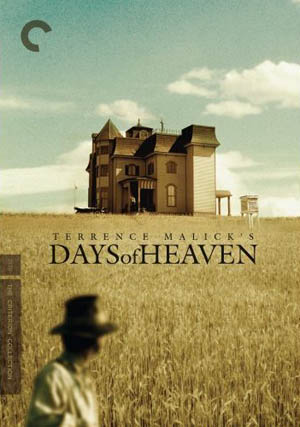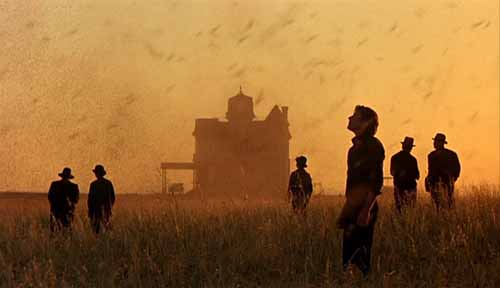
Micky says...
This is a dreamy film because it has been a few days since we watched it, and I remember images from it like a dream. Golden wheat moving in the wind, close-ups of jangly-looking multi-coloured locusts, a big old estate house in the middle of miles and miles of wheat fields. When I lived in Canada (Regina, Saskatchewan to be exact), there was a popular joke that it's so flat there that you can see your dog running away for three days. The atmosphere created by this film is like that, plenty of dog-running-away room. You get a feel from this even from the image above. Four characters in the middle of miles and miles of space. (BTW, when Ads and I travelled through Canada in 2007 we overheard someone telling this joke - 15 years later the joke continues to live on!).
It is a film about love in it's many guises - but not in a stated, judgemental or assumptive way - and deliberately toys with similarities between filial and romantic love as Bill (Richard Gere) and Abby (Brooke Adams) pretend they are related, for reasons that are unclear. Especially through the character of Abby we are led to question humanity's need to define love and parcel it up into stated categories. For though she loves Bill, she is also definitely feeling something for the farmer (Sam Shepard). (I checked for his character name on IMDB because I have terrible memory for names - turns out he is just called 'The Farmer'!)
In general this is a film that just lets things happens and doesn't feel the need to force messages or meaning down it's viewers throat (or eyes/ears). The narrator Linda Manz (as Bill's younger sister Linda) mumbles through sentences that it seems Malick never intended us to actually hear. He doesn't see any need for spelling out what has happened or is happening. He assumes that it's viewer can make sense of it for themselves, and if not just to sit back and enjoy his beautiful images. The film is meandering and spacious but never dull, and in general it feels like something very unique and atmospheric.
As I am not as film literate as Ads, when he told me that this director also directed The Thin Red Line I could immediately see the similarities. If you liked that film you should see this and not be put off by the fact that Richard Gere is in it - in this he's young, says very little, and is in fact very very good (I personally don't have a problem with Richard Gere but apparently others do!). It won a bunch of awards and rightly so.

Ads says...
The seventies are often referred to as Hollywood's second golden age, when a number of emerging directors (Scorsese, Coppola etc.) were reinventing American cinema for a new audience. Terrence Malick directed two films in the seventies that easily earned him a place alongside those visionaries - Badlands from 1973, and this one.
This is one of the most visually stunning films I've ever seen. Seriously, every shot has clearly been laboured over, and there's a stylistic point and purpose to every shot - they're not just to convey what one character is saying to anonther - every shot means something in terms of mood and style. It;s one of the most beautiful films I've ever seen, and I think when we were watching it Michelle got sick of me saying "Woah, that's a great shot!" From the early scenes in the slums of "Chicaga" as the characters refer to it, through their arrival on the farm with its golden fields of wheat, to the amazing sequence where a swarm of locusts invades the farm, there's something to marvel at in every shot. Another great aspect of the cinematography is the fact that I'd say around 70% of the film was shot during magic hour - that tome of day just before the sun goes down where everything looks golden and magical.
But the cinematography is not the only thing this film has going for it. It's very deliberately edited too, and each sequence has a very deliberate point. One scene for example, may incorporate several shots where no one says anything, and then right at the end of the scene someone say one line, so although that line progresses the plot, it's slotted into the film in a way that doesn't privelige the narrative, but the mood and atmosphere. The relationships between the characters is revealed in this particularly subtle manner. I was conscious of the editing during the slower stretches, but the film's stylistic elements and the performances ensured that I didn't mind that.
And the performances are all uniformly strong. Sam Shepard's great as a man torn, and though he doesn't say much, he ably conveys the complex emotions his character is going through as a farmer who had everything except someone to love, and then when he finds that it comes at a price. I also thought Richard Gere was pretty amazing too. I guess after Pretty Woman Richard Gere came to represent something a bit off-putting to a lot of people, and I must admit that I've never really admired him as an actor in anything I've seen him in, but he's really excellent in this, and I even found him a bit attractive too (*blush*). But the standout performance for me was Linda Manz. I've been a fan of hers ever since I saw her in Gummo, and although I didn't really know who she was, I thought she was great in that - raw, and tough and tender all at once. She has that magnetism here too - she seems so natural - almost as though she was in a documentary, and as Micky mentioned, her voice over is fantastic too.
I think everything that needs to be said about this film has been - there's not a lot of plot to speak of, so it's best not to reveal too much, and you can't really do the film's majestic visual style justice just by writing about it. I think this is a major piece of cinema - albeit an understated and particularly graceful one, and I would encourage everyone to see it, because it's beautiful, emotionally honest and dreamily mesmerising.